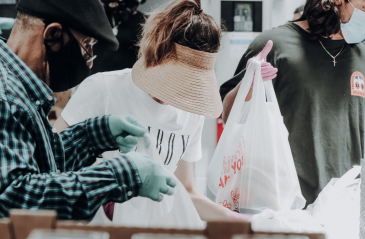
Building Legitimacy: Lessons from Across Sectors


During @CPI_foundation's Earned Legitimacy Learning Cohort, @HarrisCountyCSD worked to integrate a culture of trust & understanding between government and the communities they serve as part of strategic planning
Share article"By holding community listening & co-ideation sessions, communities will be empowered to be involved in the development of programs and initiatives that impact them directly" @HarrisCountyCSD
Share articleLOAF means... 👀 Look within yourself, ✋ offer a hand, not a gavel, 🚪 accessibility, 🤝 familiarity = @HarrisCountyCSD's guide for safe, respectful community listening
Share articleWe put our vision for government into practice through learning partner projects that align with our values and help reimagine government so that it works for everyone.
In 2021, CPI launched the Earned Legitimacy Learning Cohort, a 10-week program during which participating governments worked to dismantle inequitable power dynamics and enable community-driven change. During the cohort, Harris County’s Community Services Department worked to integrate a culture of trust and understanding between government and the communities they serve as a part of strategic planning. Ultimately, Harris County strove to foster beneficial dialogue, provide guidance on how to drive government strategies forward, improve efficiency, and increase effectiveness by building meaningful, trustworthy relationships with constituents.
In a time of much uncertainty – where CDC guidelines change monthly, COVID-19 threat levels are back to red, and disaster relief funds are being exhausted – communities are looking to the local government for guidance and reassurance. While local governments are adhering to state and federal mandates, establishing and maintaining connections with communities has been a great hardship.
Communities feel abandoned. Assistance is needed in their communities, along with support from local governments who are themselves still in the thick of this pandemic. Individuals are unable to go back to work or obtain any financial support for their households. People are losing sight of the light at the end of this dark tunnel.
Recognizing the feeling of disconnection, Harris County, TX, is making efforts to increase community engagement after participating in CPI’s Earned Legitimacy Learning Cohort, a program designed to build trust among communities and government agencies. I believe that by holding community listening sessions and co-ideation sessions, two tactics taught during the Cohort, communities will be empowered to be involved in the development of programs and initiatives that impact them directly.
Harris County’s efforts are focused on helping residents access affordable housing. Currently, residents may face many barriers when seeking assistance: minimal low-income properties, high crime rates in the neighborhoods that meet their income level, criminal background checks that reflect felonies despite non-violent offenses, language barriers, and lack of empathy from leasing offices and landlords when a resident is unable to obtain current identification due to DMV closure or limited appointments from the pandemic. Residents have been looking to our agency, Harris County Community Services, for additional support throughout this time when so many members of our community are in dire need of support. Our department is working hard to better serve the people.
Two key ways we aim to better serve our community are by holding listening and co-ideation sessions. Listening sessions are collaborative meetings with government agencies and communities to 1) learn directly from community members and 2) begin building trusting relations. There are four main components to listening sessions to ensure conversation is built and trust isn't broken: define purpose, establish rapport, build empathy, and wrap up. Through listening sessions we engage with the community to hear their concerns and hold ourselves accountable. This can strengthen the connection between parties to become proactive rather than reactive to discussed issues.
Once trust has been established with key community leaders, a solid foundation for future sessions can follow.
Once a solid foundation of trust with community leaders has been established, it leads to hosting co-ideation sessions. During these sessions, departments and community leaders can brainstorm ideas (initiatives or programs) that will truly benefit the community in the direction they want. The ultimate goal of this work is to place the microphone back into the hands of the community and amplify their desires with government support.
By holding space for government agencies to take initiative to reach communities where they are and allow them to present their concerns in a healthy and constructive way, we can increase community engagement and hold government agencies accountable to their responsibilities. Communities will feel seen, heard, and appreciated by their local government and more inclined to seek help when needed. Once trust has been established with key community leaders, a solid foundation for future sessions can follow.
Here at Harris County, much time was spent during the 10-week Earned Legitimacy Learning Cohort connecting with community leaders. These individuals were willing to represent their communities, including those who were unwilling or unable to voice their concerns. This allowed us to hear more voices and perspectives than we have been able to in the past.
These communities, which may be housed in low-income areas, are historically marginalized, and/or are of different backgrounds, are often afraid of involvement with the government out of fear of repercussions. I believe communities should not be afraid of their government, as they are the reason we are here. This sentiment was one we tried to convey to residents through our work during the Cohort.
Communities should not be afraid of their government, as they are the reason we are here.
We at Harris County worked to create a safe space for residents to adequately present issues such as minimal transportation within their area, accessible and affordable health care, and options for healthy food in food deserts. The people we serve every day are frustrated by the limitations in their area and often lack support from their local governments to combat the inequities they experience.
During the Cohort, we were able to connect with five key community leaders (i.e, pastors, partner agencies, and activists) in two different areas within Harris County (Greenspoint and East End) to partake in our community listening sessions. These individuals were vital in our search for representatives for the co-ideation session that followed, offered much insight into the hardships of these underrepresented communities, and vigorously expressed the frustrations of these communities. Allowing these one-hour sessions with each individual through Zoom gave the foundation of the support the community needed.
After an internal debrief, a co-ideation session was soon scheduled. Harris County contacted the same five community leaders but also invited five residents who were either undocumented immigrants or experiencing homelessness to participate. Participating in the co-ideation session gave residents a true sense of pride for their community, community leaders a final exhale that they were being heard, and a sense of humility for the Harris County team. By allowing time and efforts to reach these two communities, Harris County’s efforts to rewrite policies that may unknowingly affect residents and develop initiatives that proactively benefit these communities are underway.
Participating in the co-ideation session gave residents a true sense of pride for their community, community leaders a final exhale that they were being heard, and a sense of humility for the Harris County team.
Harris County received support from CPI Learning Liaisons on how to create these safe spaces for conversations with community leaders. Based on their guidance, our team at Harris County created a foundation to perform these sessions effectively and respectfully for all parties called LOAF.

Look within yourself
Recruiting and reaching community leaders for these sessions can take time. In most cases, we (agencies) or someone we work with (partner agencies) know of individuals who are making a direct impact with the communities and are frontline to their needs and concerns. To reach these leaders, agencies should be prepared to make great efforts to connect, including reaching out via multiple methods such as phone and email. This can be particularly difficult when working with residents experiencing homelessness, undocumented individuals, and communities with limited resources.
Agencies should be prepared to make great efforts to connect, including reaching out via multiple methods such as phone and email.
Once reached, it is important that we look within ourselves to understand and mind our biases and egos. We must ensure the community leaders understand that they are important to our ability to better serve all residents. We found that community leaders were excited to be a part of our sessions and more than willing to give insights and advocate for their community.
Offer a hand, not a gavel
Leaders participating in the sessions uniquely recognize the needs of their community. They deserve to feel appreciated and respected in their interactions with the government. The government does not have all the answers (if we did, our services would be enough for all communities to flourish!) Insights from leaders are key for us to better understand and support the communities they represent.
To create an environment that encourages leaders to speak openly and provide us with important insights, it is important that the government representatives remain humble. We must remember that these leaders do not need to participate in our sessions - they are willing to speak to us and give their time because they would very much like to see a change in the interaction between the government and their community.
We must remember that these leaders do not need to participate in our sessions - they are willing to speak to us and give their time because they would very much like to see a change.
Accessibility
Creating a space for the community to provide insights was challenging, particularly during a pandemic. During the Earned Legitimacy Learning Cohort, we secured space to host up to five residents and maintain CDC guidelines for social distancing. To increase accessibility, we provided bus passes for our homeless and undocumented residents to come to our office and use laptops to access Zoom. This session was virtual, but the hope, post-pandemic, is that we can host these sessions in-house.
Allotting time, space, and resources to ensure the residents, community members, and leaders feel comfortable to voice their opinions is key when making room for community listening sessions.
Familiarity
While community listening sessions were focused on understanding the challenges residents faced, co-ideation sessions were focused on building solutions. Co-ideation sessions allow leaders and the communities they represent to have a say in the services being offered and policies being made. Their lived experience means they are the most familiar with the problems and can best understand which solutions might work, so their involvement is imperative.
Over time, community leaders will become more familiar with faces at our agency. We hope they will begin to send other residents directly to us, knowing that they will be taken care of as best as we can. Allowing true transparency from local government can only be found on 1:1 connections.
LOAF encompasses key concepts that we believe lead to better community engagement and, ultimately, allow local governments to take a more active role in meeting the needs of the community. By establishing a clear foundation of trust between community leaders, residents, and the government, we can better understand the challenges our communities face and design solutions that will work for them.
Now we have built the space for communities to actively voice their concerns and work with us to develop programs that they are proud of.
Our work in the Earned Legitimacy Learning Cohort shifted the way we work with communities. Previously, many residents interacted with the government only when receiving assistance in response to disaster or recovery, while now we have built the space for communities to actively voice their concerns and work with us to develop programs that they are proud of. Harris County hopes to continue with this approach, working closely with community leaders to develop key initiatives in housing affordability that can be a blueprint for other local governments.
Are you interested in reading more about the progress and developments of the Earned Legitimacy Learning Cohort?





